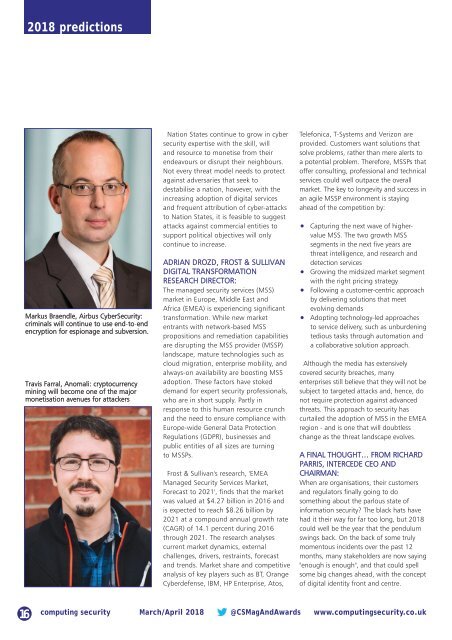You also want an ePaper? Increase the reach of your titles
YUMPU automatically turns print PDFs into web optimized ePapers that Google loves.
2018 predictions<br />
Markus Braendle, Airbus CyberSecurity:<br />
criminals will continue to use end-to-end<br />
encryption for espionage and subversion.<br />
Travis Farral, Anomali: cryptocurrency<br />
mining will become one of the major<br />
monetisation avenues for attackers<br />
Nation States continue to grow in cyber<br />
security expertise with the skill, will<br />
and resource to monetise from their<br />
endeavours or disrupt their neighbours.<br />
Not every threat model needs to protect<br />
against adversaries that seek to<br />
destabilise a nation, however, with the<br />
increasing adoption of digital services<br />
and frequent attribution of cyber-attacks<br />
to Nation States, it is feasible to suggest<br />
attacks against commercial entities to<br />
support political objectives will only<br />
continue to increase.<br />
ADRIAN DROZD, FROST & SULLIVAN<br />
DIGITAL TRANSFORMATION<br />
RESEARCH DIRECTOR:<br />
The managed security services (MSS)<br />
market in Europe, Middle East and<br />
Africa (EMEA) is experiencing significant<br />
transformation. While new market<br />
entrants with network-based MSS<br />
propositions and remediation capabilities<br />
are disrupting the MSS provider (MSSP)<br />
landscape, mature technologies such as<br />
cloud migration, enterprise mobility, and<br />
always-on availability are boosting MSS<br />
adoption. These factors have stoked<br />
demand for expert security professionals,<br />
who are in short supply. Partly in<br />
response to this human resource crunch<br />
and the need to ensure compliance with<br />
Europe-wide General Data Protection<br />
Regulations (GDPR), businesses and<br />
public entities of all sizes are turning<br />
to MSSPs.<br />
Frost & Sullivan's research, 'EMEA<br />
Managed Security Services Market,<br />
Forecast to 2021', finds that the market<br />
was valued at $4.27 billion in 2016 and<br />
is expected to reach $8.26 billion by<br />
2021 at a compound annual growth rate<br />
(CAGR) of 14.1 percent during 2016<br />
through 2021. The research analyses<br />
current market dynamics, external<br />
challenges, drivers, restraints, forecast<br />
and trends. Market share and competitive<br />
analysis of key players such as BT, Orange<br />
Cyberdefense, IBM, HP Enterprise, Atos,<br />
Telefonica, T-Systems and Verizon are<br />
provided. Customers want solutions that<br />
solve problems, rather than mere alerts to<br />
a potential problem. Therefore, MSSPs that<br />
offer consulting, professional and technical<br />
services could well outpace the overall<br />
market. The key to longevity and success in<br />
an agile MSSP environment is staying<br />
ahead of the competition by:<br />
Capturing the next wave of highervalue<br />
MSS. The two growth MSS<br />
segments in the next five years are<br />
threat intelligence, and research and<br />
detection services<br />
Growing the midsized market segment<br />
with the right pricing strategy<br />
Following a customer-centric approach<br />
by delivering solutions that meet<br />
evolving demands<br />
Adopting technology-led approaches<br />
to service delivery, such as unburdening<br />
tedious tasks through automation and<br />
a collaborative solution approach.<br />
Although the media has extensively<br />
covered security breaches, many<br />
enterprises still believe that they will not be<br />
subject to targeted attacks and, hence, do<br />
not require protection against advanced<br />
threats. This approach to security has<br />
curtailed the adoption of MSS in the EMEA<br />
region - and is one that will doubtless<br />
change as the threat landscape evolves.<br />
A FINAL THOUGHT… FROM RICHARD<br />
PARRIS, INTERCEDE CEO AND<br />
CHAIRMAN:<br />
When are organisations, their customers<br />
and regulators finally going to do<br />
something about the parlous state of<br />
information security? The black hats have<br />
had it their way for far too long, but 2018<br />
could well be the year that the pendulum<br />
swings back. On the back of some truly<br />
momentous incidents over the past 12<br />
months, many stakeholders are now saying<br />
"enough is enough", and that could spell<br />
some big changes ahead, with the concept<br />
of digital identity front and centre.<br />
16<br />
computing security March/April 2018 @CSMagAndAwards www.computingsecurity.co.uk

















